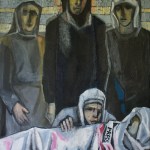
After the opening exhibition, a conference on the topic “The Global GDR. A Transcultural Art History (1949–1990)” as well as academic discussion groups and an accompanying program on the online platform voices in 2022, the “KONTRAPOINTS” project will culminate in the exhibition “Revolutionary Romances? Global Art Histories in the GDR” in the Albertinum.
- Exhibition Site Albertinum
- DATES 04/11/2023—02/06/2024
- Opening Hours daily 10—18, Monday closed
- Admission Fees normal 12 €, reduced 9 €, under 17 free, groups (10 persons and more) 11 €
This exhibition focuses on the ›revolutionary romances‹ – the friendly revolutionary relations – that were carried on by the German Democratic Republic (GDR) with countries of the Global South. It thus takes a closer look at the little-studied subject of East German art in the context of global, transcultural art histories.
In the 1960s, following on the heels of the Cuban revolution, decolonization in Africa and erupting communist liberation movements, socialism seemed to be on the rise worldwide: the utopian vision of a socialist world community mobilised the Eastern Bloc. Turning to the Global South gave the GDR the international recognition it had long hoped for and had been denied in the West, and enabled it to demonstrate state sovereignty and openness to the world. ›International friendship‹ and ›international solidarity‹ were ideological leitmotifs that shaped East Germany’s foreign policy in Asia, Africa and Latin America, motivated as it was by not only political but also economic interests. These concepts also informed foreign culturalpolicy and became important themes in state propaganda and in the visual arts of the GDR.
Featured: Abed Abdi

Based on the collections of the Staatliche Kunstsammlungen Dresden (SKD), supplemented by selected loans, the exhibition explores the artistic practice, themes, and motifs of these actual and supposed ›Revolutionary Romances‹. On display are works from the 1950s to the 1980s by artists from the GDR, Cuba, Chile, Vietnam, India, Iraq, Libya, Mozambique, Burma (Myanmar) and other countries. The works include representations of ideals and icons of socialist internationalism, images of solidarity, works of artistic protest against war and violence in Asia, Africa and Latin America, and Cuban revolutionary graphic works, travel images, mail art as well as diploma works by foreign students at the Dresden Academy of Fine Arts.
Shown alongside works from the collections of the SKD are contemporary international positions and commissioned works by Georges Adéagbo, Sven Johne, Hamlet Lavastida, Dana Lorenz, Sonya Schönberger, Wenke Seemann, Abed Abdi, Sung Tieu and Arlette Quỳnh-Anh Trần, which consider and critically analyse from a present-day perspective the former ideals of ›solidarity‹ and ›international friendship‹.

From today’s point of view, it is necessary to question some of the exhibited artworks that were created in the GDR because they express a dominance of Eurocentric perspectives, forms of cultural appropriation as well as stereotypes about people and cultures of the Global South. What must further be taken into consideration is the contradiction between ideology and reality in East Germany, which is obvious in retrospect: the contradiction between criticising Western imperialism while failing to acknowledge the imperial expansion practiced by the East, between the demand for universal human rights in foreign policy and the repressive politics in the country itself, as well as between the anti-racism proclaimed by the state and the real living and working conditions of foreign contract workers and students.

With Revolutionary Romances?, the Albertinum is approaching for the first time –through study, questioning, self-criticism and in the face of many gaps in knowledge – a topical subject area which the Dresden collections are only now beginning to investigate. To achieve the goal of discussing the art history of the GDR in a global, transcultural context, further art historical, historical and artistic research is needed – research in which the perspectives and the expertise of people from the Global South are seen and heard.



















